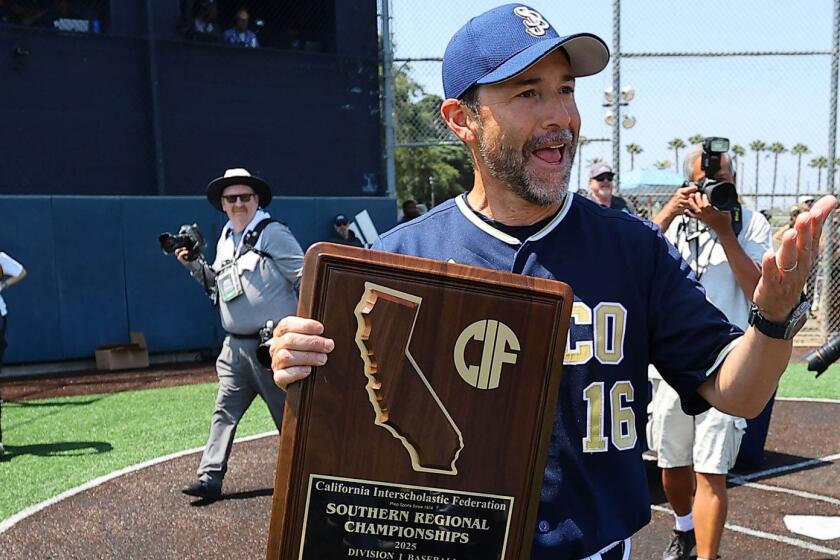A Trail Blazer Who Was in a League of His Own
- Share via
He was Jackie Robinson without the applause. He lived through the hatred without the heroism. He blazed a trail that disappeared into shadows.
When Larry Doby died Wednesday at 79, a man who was never properly introduced was given a mangled farewell.
“The second black player to play in the major leagues,” blared the headlines atop the stories of a man who wore enough scars to prove he wasn’t the second anything.
Robinson was the first black to play in the National League, Doby the first to play in the American League.
Only 11 weeks separated their arrivals. The leagues were like two different worlds, equalizing their pain.
“Playing in a different league, Larry went through the same things Jackie went through,” said former Dodger star Maury Wills, who knew both men. “People seem to forget that.”
Robinson was the first black to play at Ebbets Field. Doby was the first black to play at Yankee Stadium.
Robinson integrated the National League-only cities of Cincinnati, Pittsburgh and Philadelphia.
Doby integrated the American League-only towns of Cleveland, Detroit and Washington.
For every well-known story of Robinson’s mistreatment in that summer of 1947, there is another, quieter story about Doby.
The same isolation from teammates, the same fights with opponents, the same path, only darker, sometimes colder.
“I put on my uniform and I went out on the field to warm up, but nobody wanted to warm up with me,” he once told the Newark Star-Ledger, recalling his debut for the Cleveland Indians on July 5, 1947. “I have never been so alone in my life.”
Yet in the public eye, alone is how he remained. History has properly lauded Robinson as a pioneer, but it has treated Doby shamefully, as if he hadn’t even been there.
Robinson was elected to the Baseball Hall of Fame by the writers in his first opportunity, only five years after his retirement.
Doby was forgotten by the writers and was not allowed into the Hall of Fame until the veterans’ committee elected him 39 years after his retirement.
Robinson’s death in 1972 was mourned like that of a president.
Doby’s death, occurring after a long illness, came as a surprise to many who hadn’t even known he was sick. Or still alive.
Friends hope that now, maybe, people will understand. Or, at least, remember.
“Larry carried this huge burden that nobody recognized him for all he had to go through,” Wills said. “He did the same things, blazed the same path, but nobody seemed to know. That really weighed on him.”
When he joined the Indians as a second baseman, three of his teammates wouldn’t shake his hand.
When he was moved to first base in the second half of his debut doubleheader, no teammate would lend him a mitt, so he borrowed one from the opposing Chicago White Sox.
His manager, Lou Boudreau, wanted him to fail, to such an extent that once, he sent Doby in as a pinch-hitter with an 0-and-2 count on the batter.
The crowds, often seeing a black major leaguer for the first time, threw beer bottles at him.
The media, wrongly thinking Robinson had solved the race problem a couple of months earlier in a different league, rarely listened.
“When I look back and think about things that were probably negative, you put those things on the back burner,” Doby said at his Hall of Fame induction ceremony in 1998. “You’re proud and happy that you’ve been a part of integrating baseball to show people that we can live together, work together, play together.”
Despite his inner torment, that conciliatory tone dominated Doby’s public persona, separating him from Robinson, pushing him further into the background.
“Larry was such a soft-spoken, well-mannered man, while Jackie was full of such fire,” recalled Wills. “I think that had an effect on things.”
As Doby’s success grew, so did the snubs.
He was part of the first World Series championship team that featured black players, helping the Indians win the 1948 title in only his second season. Yet he still couldn’t walk through the front entrance of certain stadiums.
At the end of that Series, he became the first black baseball player photographed being hugged by a white player, pitcher Steve Gromek. Yet opposing white players still spit tobacco juice on him and called him “shoeshine boy.”
Six years later, as an outfielder, he led the American League in homers and runs batted in while leading the Indians to another pennant. Baseball voters gave the MVP award to Yogi Berra of the second-place Yankees.
“I never did quite figure out the voting that year, being that I had been with the team that won,” Doby told reporters.
In 1978, Doby became the second black manager, following Frank Robinson.
“Being second ain’t all that bad, baby,” Doby said at his induction ceremony.
But the perception that he was only second-best made him wait for that election, even past 1997, the 50th anniversary of his integration.
He thought that if he didn’t get the key to Cooperstown that summer, he never would.
When he was shunned again, he gave up hope.
“We talked a long time about it once, and he got all choked up, thinking about those days,” Wills said.
But a year later, the phone rang, the voice was welcoming, and out of the shadows he stepped, into the Hall on one of the great makeup calls of all time.
Amazingly, Jackie Robinson’s Hall of Fame plaque does not mention a word about integration.
Even more amazingly, Larry Doby’s does.
Bill Plaschke can be reached at bill.plaschke@latimes.com.
More to Read
Go beyond the scoreboard
Get the latest on L.A.'s teams in the daily Sports Report newsletter.
You may occasionally receive promotional content from the Los Angeles Times.











